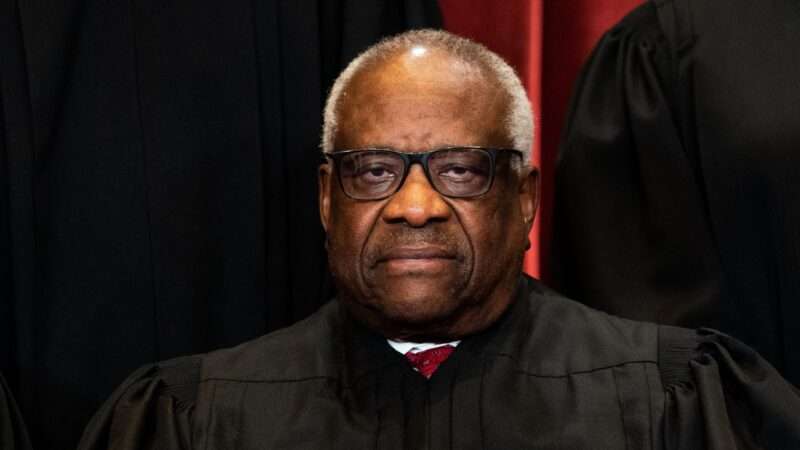
Clarence Thomas is no liberal hero. The associate justice on the U.S. Supreme Court is the most conservative member atop the highest rung of the American judiciary. And he has once again railed against qualified immunity, the legal doctrine that makes it almost comically difficult to hold government officials accountable for misconduct when they violate your rights.
“As I have noted before, our qualified immunity jurisprudence stands on shaky ground,” he wrote today.
On the congressional level, that rallying cry has primarily been championed by Democrats, tied to police reform legislation that Republicans have resisted. Among the state actors recently protected by qualified immunity: two cops who tased a suicidal man they knew was covered in gasoline, causing him to burst into flames; a cop who led a bungled SWAT raid that saw an innocent 78-year-old’s home damaged with flash-bang grenades; a cop who shot a 15-year-old on his way to school; a cop who shot a 10-year-old while aiming at a nonthreatening dog.
The legal doctrine prohibits victims from suing government actors for misconduct unless their exact behavior has been deemed unconstitutional somewhere in a preexisting court ruling. If not, then victims are out of luck, even when the court admits that the state violated their rights. In all the above cases, the plaintiffs were not given the privilege of bringing their cases before a jury.
Last year, Thomas expressed his skepticism toward qualified immunity in Baxter v. Bracey, a case that saw two cops unleash a police dog on a man who had already surrendered. The Supreme Court declined to hear that case, with Thomas as the lone dissenter.
But qualified immunity doesn’t only protect police. It protects government officials in general, something that Thomas honed in on today as he protested the Court’s refusal to hear a different case: Hoggard v. Rhodes, a lawsuit surrounding a student who had her First Amendment rights violated by Arkansas State University. The administrators received qualified immunity, and thus will not be held accountable.
“The one-size-fits-all doctrine is also an odd fit for many cases because the same test applies to officers who exercise a wide range of responsibilities and functions,” said Thomas. “Why should university officers, who have time to make calculated choices about enacting or enforcing unconstitutional policies, receive the same protection as a police officer who makes a split-second decision to use force in a dangerous setting? We have never offered a satisfactory explanation to this question.”
In fall of 2017, Ashlyn Hoggard set up a table in front of the student union to recruit peers for a new chapter of Turning Point USA, a conservative advocacy group that focuses on student organizing. Administrators phoned the police, who shut Hoggard’s operation down and threatened to punish her for violating the student code of conduct. University policy required permission to speak anywhere on college grounds and carved out “speech zones”—totaling 1 percent of campus—where such activity was allowed.
The U.S. Court of Appeals for the 8th Circuit agreed that Hoggard’s First Amendment rights were violated. But in the same breath, they granted the administrators qualified immunity. Without a near-identical court precedent already on the books—one that mirrored the facts of Hoggard’s case—the university employees couldn’t have known what they were doing was illegal, the court said.
“Public university officials shouldn’t get to hide behind qualified immunity when they blatantly violate their students’ First Amendment rights,” says Chris Schandevel, legal counsel for Alliance Defending Freedom and one of Hoggard’s attorneys. “As Justice Thomas correctly noted, university officials have plenty of time to review their policies and consider the constitutionality of their actions. We’re disappointed the Court chose not hear this case, but we are hopeful the Court will heed Justice Thomas’s recommendation and take up the doctrine of qualified immunity in the future.”
It was, after all, the Supreme Court that legislated the legal principle into existence. Current civil rights law explicitly permits victims of government abuse to seek recourse for damages, but the high court concocted qualified immunity in direct contention with that, first in Pierson v. Ray (1967) and then in Harlow v. Fitzgerald (1982).
Yet while the Supreme Court made this mess, it has declined to consider an avalanche of cases that would have potentially reshaped the doctrine. Some recent petitions refused by the justices: a case that saw a cop kill a man who’d been sleeping his car; a case that saw two cops assault and arrest a man for standing outside of his own house; and a case that saw two cops allegedly steal $225,000 during the execution of a search warrant. They all received qualified immunity.
“We have ‘substitute[d] our own policy preferences for the mandates of Congress’ by conjuring up blanket immunity,” noted Thomas, “and then failed to justify our enacted policy.”
from Latest – Reason.com https://ift.tt/3jBfScC
via IFTTT